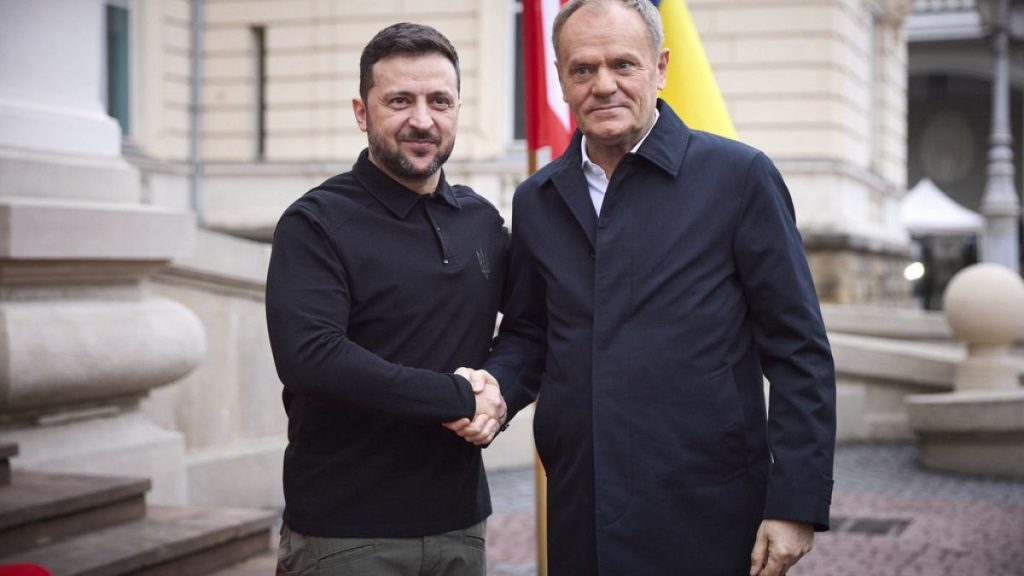Summarize this content to 2000 words in 6 paragraphs
The massacre of around 100,000 Polish civilians by a Ukrainian paramilitary force had long soured diplomatic relations between the otherwise close allies.
A decision to exhume the bodies of the victims of the Volhynia Massacre has been made, according to Prime Minister of Poland Donald Tusk. “Finally, a breakthrough. A decision has been made on the first exhumations of Polish victims of the UPA. I would like to thank the ministers of culture of Poland and Ukraine for their good cooperation. We are waiting for further decisions,” Tusk wrote in a post on X. In 1943 the Ukrainian Insurgent Army (UPA) carried out a series of massacres in the Volhynia and Eastern Galicia regions of what was then German-occupied Poland, resulting in the deaths of an estimated 100,000 Polish civilians. People from other ethnicities were also massacred, including Armenians, Jews, Russians, Czechs, Georgians, historians have said.The UPA was an ethnic Ukrainian paramilitary force which collaborated with Nazi Germany.The tragedy has long been a point of contention between the two countries, causing friction between the otherwise close allies. While Poland officially recognises the Massacre as a genocide, Ukraine disputes this characterisation, viewing it as a conflict in which both sides were responsible. Ukrainian officials have said that both the UPA and the Organization of Ukrainian nationalists (OUN) were part of the resistance against communist Soviet Union.Many in Poland have advocated for the exhumation of an estimated 55,000 Polish and 10,000 Jewish victims who, according to Poland’s Institute of National Remembrance (IPN), “still lie in death pits in Volhynia, waiting to be found, exhumed and buried”. In June of last year, deputy Prime Minister of Poland Władysław Kosiniak-Kamysz stated in an interview with the Polsat broadcaster that “Ukraine will not join the European Union if the Volhynia issue is not resolved.” “We want Ukraine to develop, but we cannot leave unattended a wound that has not healed,” he said in the interview, “Issues regarding the genocide in Volhynia remain unresolved.” This week, Karol Nawrocki, a presidential candidate endorsed by the conservative opposition Law and Justice (PiS) party, made a similar statement. “Currently, I do not envision Ukraine in either the European Union or NATO until important civilisational issues for Poland are resolved,” said Nawrocki, who is currently serving as the head of the Institute of National Remembrance. INR is a state research body responsible for investigating an archiving crimes against Poland that took place during the Second World War and the Communist period that followed. “A country that is not able to account for a very brutal crime against 120,000 of its neighbours cannot be part of international alliances,” Nawrocki added. Replying to Tusk’s announcement on X, Nawrocki stated that if confirmed, the news of the exhumations is “great news.” “We (INR) have been fully prepared and determined for years,” he said, “We are waiting for official information, and we are starting to fulfil our obligations to Poland.” The most recent iteration of the dispute began in 2017, when Ukraine issued a ban on the search for and exhumation of Polish victims on its territory, following the removal of a monument to the UPA in Hruszowice in Poland. Since then, efforts have been made on the parts of both countries to ease these tensions and overcome these historical traumas. In July of 2023, Presidents Andrzej Duda and Volodymyr Zelenskyy marked the 80th anniversary of the massacres together during a commemorative mass in Lutsk, in northwestern Ukraine. During the service, the two leaders walked side by side, acknowledging the shared trauma that took place in the region. However, in an opinion poll carried out by the Mieroszewski Center, the percentage of Ukrainians having a good opinion of Poles has decreased from 67% to 44.5% in the past year. When asked to identify the causes of contention between the two countries, 26% blamed the grain crisis and border blockades, while 19% blamed ongoing tensions over the Volhynia massacres. Officials on both sides hope that Tusk’s announcement and an official agreement on exhumations will help to ease tensions and put an end to soured relations. “We respect each other and together we stand up to Russian imperialism,” Ukrainian Minister of Foreign Affairs Andrii Sybiha wrote on X following Tusk’s announcement, “Any agreement in UA-PL relations is a blow to Moscow.”
Keep Reading
Subscribe to Updates
Get the latest creative news from FooBar about art, design and business.
© 2026 Globe Timeline. All Rights Reserved.













